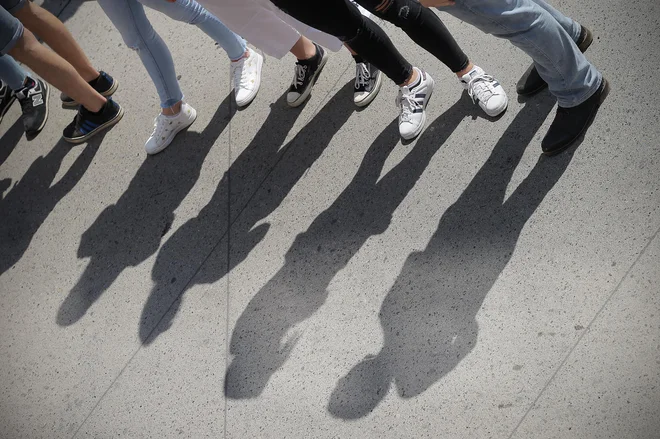To stagnate democracy the most guilt is carried by police

Slovenia is a formally democratic state, and in truth it works on the fragile foundations of distrust, apathy and fragmentation. Sociologist Urban Vehovar spreads in the podcast on the edge without embellishment: “We have not developed effective supervisory institutions. The police should be crucial, but often not part of the solution, but the problem. ”In this context, it is not surprising that more than half of the Slovenes are no longer going to the polls – and that almost no one is seriously talking about it.
Vehovar points out that history is not developing linearly, but cyclical, which, in his opinion, is the key to understanding today: « History is repeated in cycles and I think we should not think that development is only a linear path from better to better. By no means. «
Urban Vehovar is a sociologist, publicist and one of the loudest critics of systemic corruption in Slovenia. He was a founding member of the quality official project (UPK) in 2000 and an advisor to the President of the Commission for the Prevention of Corruption (CCP) Goran Klemenčič between 2011 and 2013. During this period he co -created key reports on the state of corruption in the country and made a significant contribution to the formation of public discourse with expressive definitions, such as « System Corruption », » The thesis that Nova Ljubljanska banka is a « heart of beasts », which is still often referred to in the media today.
As one of the founders of the Academy of Democracy, Vehovar regularly focuses on issues of the effectiveness of supervisory institutions, the importance of democracy and the impact of political elites on social development
It divides European history into three major turning points: the period of wars (1914–1945), the post -war period of growth (1955-1973), and the period of stagnation and crisis that has been dragging on in recent decades. It places Slovenia in the flow of these European processes and adds its own three turning points: 1918-the breakup of Austria-Hungary, 1945-the takeover of power by the revolutionary fraction, 1990-Triple transition (in democracy, market economy and national independence).
Vehovar also believes that after the transition, there was no significant emergence of new elites. « Unfortunately, the new elites were quite limited, or there were very few relatively. »
Vehovar believes that the authorities have anchored and maintained the influence to this day after 1945.
The eighth richest company
Nevertheless, Slovenia today achieves high standards of quality of life. « According to the latest data, we are the eighth richest company in the world according to all this information, » he says.
« Basically what is most critical to Slovenia is that we have never developed effective supervisory institutions, » says the interviewee, pointing out the worrying links between the judiciary, the police and the policy. In his opinion, the police, who should play a key role in providing justice and control, is often part of the problem, is often part of the problem, not a solution.
Vehovar also points out that we are thinking too often in binary oppositions – the elites against the masses, liberally against the conservative. But he is interested in something deeper: how society as a whole works for the benefit of the community. He is critical of the division of Slovenian politics, which, in his words, does not exceed the cultural struggle during the « left-wing-and-aggressive camp, mixed with Slovenian urbanism, » and the other side symbolized by Janša.
It also emphasizes the importance of trust in the system – something that the Germans still preserve, and Slovenes are increasingly losing. Photo: Marko Feist
The mutual cock of mutual
« Both sides are addressing a very limited part of the population, which they are bubbling against each other, » he warns. Meanwhile, more than 50 percent of Slovenes are no longer going to the polls – a sign that democracy is in a serious crisis that almost no one is talking about.
The debate also touches on the questions why, despite this apathy, Slovenes discuss politics so much in private environments. Vehovar believes that people devote too little energy to everyday life, leaving politicians to form even their intimate spheres such as family and community. « We have allowed politicians to order our daily lives, » he warns and compares Slovenes with Italians who know how to « live with corrupt politics » with more humor and distance.
It also emphasizes the importance of trust in the system – something that the Germans still preserve, and Slovenes are increasingly losing. He says that younger generations in Slovenia are not necessarily apathetic, but « more progressive, more oriented towards environmental and philanthropic values. » In his opinion, even so much that they cannot see beyond these obstacles. Part of society, especially the lower classes, is much more practically oriented – often more prone to conspiracy theories and resistance to migration.
Global warming as a religion
In doing so, he also points out the breakup of traditional structures: “Some conspiracy theories have become a new religion. Korona was quasi spirituality, and global warming also gains religious moves. «
Pijanovič adds that the fragmentation and small size of modern communities may contribute to political apathy. Vehovar agrees and mentions the thought of his colleague, sociologist Fran Adam, who spoke of a world without clear values - or a world where there are simply too many.
« People live in a supermarket today, which is psychologically extremely uncomfortable, » he says.
The entrance pointed to the growing epidemic of loneliness in contemporary societies. He discussed the impact of industrialization and urbanization on the dissolution of traditional communities and the importance of establishing new forms of social connection and support. He emphasized that loneliness can be the result of both overweight and over -dependence on family.






